SGA walkthrough determines changes to be made to Orlando Hall accessibility

Amid the staccato of hammer drills and the reverberation of excavators and cranes coming from construction across campus, another form of redesign is well underway.
The Rollins Accessibility Improvement Project (AIP) is a collaboration between the Accessibility Services and Facilities Services departments and is open to all members of the campus community. It first developed as a response to an audit done of the physical campus in 2019 but has since blossomed into much more.
Bethann Durlin, Director of Accessibility Services, said, “When I started in 2021, that project had been hijacked by COVID, so I reopened that initiative, and with the help of facilities, we created this committee. It’s a means by which our campus community members can be heard and be part of the prioritization of accessibility improvements on campus.”
Through a recent walkthrough of the campus’ physical accessibility in partnership with the Student Government Association, AIP was able to determine where their annual budget would go based on student responses. “I think that partnering with SGA and other student organizations is very beneficial. Students have great ideas, and when they can share their opinions about what matters to them, it helps us prioritize our work,” said Durlin.
SGA Special Projects Chair James Hall (‘26) and Accessibility Senator Ana Chust Puchades (‘28) were able to collaborate with AIP to make the walkthrough happen. “We distributed flyers across campus and publicized the event, which helped it reach people who wouldn’t otherwise be aware of accessibility-related activism on campus. We were able to get a good crowd of engaged students who had many suggestions and ideas for how to improve on-campus accessibility,” said Hall.
Post-event, AIP held a meeting to determine the most pressing and achievable improvements pointed out by students on the walk. Durlin said, “Participating students were able to identify areas of campus that they felt were not as accessible as they could be, talk those issues through with the group, and submit barrier reports through the Barrier Report form online.”
The Barrier Report form is a resource for students to report issues related to a lack of access on campus through the MyRollins portal and can be found under the “Report an Incident” button. The top five concerns were then discussed the following week, and “As of our February 19 meeting, the committee voted to move forward with the Orlando Hall bathroom remediation, pending approvals and budget,” said Jeremy Williamson, Assistant Vice President of Facilities Services.
Durlin also said, “One immediately resolvable issue that was brought to light through that walkthrough was that the door to the accessible entrance at Hauck Hall had been locked from the inside, preventing use of that entrance. We were able to partner with Campus Safety to resolve that issue immediately.”
While budget and timeline specifics have not been finalized yet, the changes to Orlando Hall will require one office space on the first floor to be relinquished for the new bathroom to be built, and AIP has already decided to roll over the 2024-2025 budget into 2025-2026 to make the project happen.
AIP’s hope is that by creating a new gender-neutral single-user bathroom on the ground floor, it will make Orlando Hall, an older building on campus, more accessible for those who cannot maneuver in the smaller two-stall restrooms currently in place, for those who cannot walk upstairs to the men’s restroom, and for those whose gender identities do not match to the two gendered restrooms currently in place.
The SGA walkthrough came about after a string of changes to Accessibility Services this academic year. In the fall 2024 semester, a campus-wide poll noted that a third of respondents felt that accessibility services had “diminished greatly,” specifically citing the physical accessibility of campus, note taking softwares, and the testing center in Olin Library.
Since then, many more changes have been made. “We were able to replace the incorrect privacy screens with solid, taller privacy screens on the testing pods in the testing center, [and] we are currently conducting student trials for three note taking software options and will use the feedback from student trials to choose a new product for launch in the fall of 2025,” said Durlin. She also noted that while the testing center has moved back to the first floor of Olin Library due to construction, the third-floor testing center is expected to be “fully back in operation for the fall.”
For the future, Williamson said AIP is looking forward to “increased involvement with students, staff, and faculty who are interested in joining these efforts and an increased awareness of the group’s purpose. Successfully executing a project that has been discussed and voted on by this group will also be a positive step.” Both Williamson and Durlin shared that one of the biggest challenges for the group has been engagement. Durlin said, “The AIP group is open to all, and we meet regularly to hear from students. If students are not able to attend these meetings, the AIP page on MyRollins has links for input via surveys, reporting of barriers, etcetera.”
The next Accessibility Improvement Project meeting will be held April 23 from 5:00-6:00 p.m. in the Van Houten room of Olin Library. Interested campus members may look for more details here.

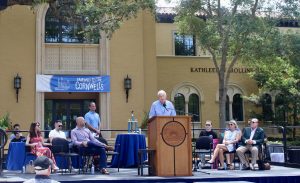

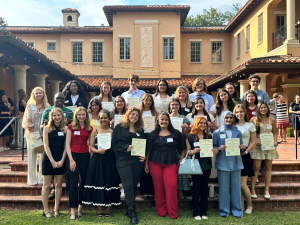
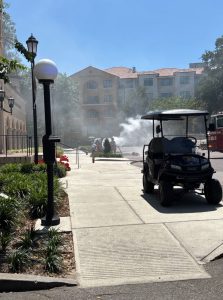


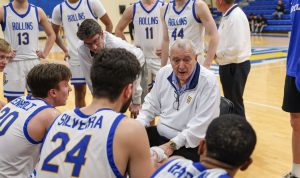
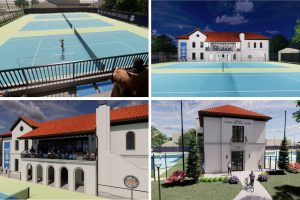



Comments are closed.